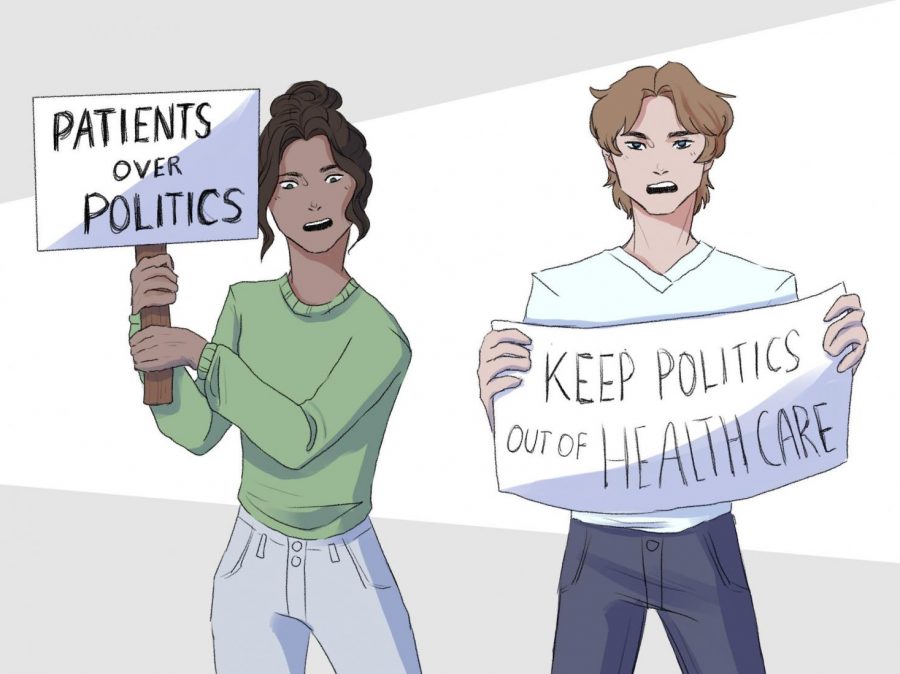Yes, the Affordable Care Act should be repealed
The Affordable Care Act (ACA) had many flaws at its inception. While some of these have since been resolved, the law still has a multitude of issues.
The ACA (otherwise known as Obamacare) was passed in 2010 and was created to provide access to healthcare for millions of uninsured Americans. The law did its job and provided over 20 million previously uninsured people with healthcare coverage. However, this large scale overhaul of the healthcare system came at a cost.
When the ACA first was signed into law, people could be fined for not having insurance. Many people, including myself, believe it is wrong for the government to levy fines on those who don’t have healthcare insurance. Adults who chose to not get health insurance could be fined either $695 or 2% of their yearly income (whichever was greater), and an additional $347.50 for children. This issue was resolved by the Trump Administration’s revised plan which became law in 2019, and it is no longer a concern.
Another issue that arose with the ACA was a rise in premiums for those who already had coverage. When the law passed, insurance companies were required to provide a wide range of benefits to those with preexisting conditions. As a result of this change, prices rose for those who already had private insurance. As a consequence, many employers were forced to downsize their workforce and reduced employee benefits to compensate for the premiums imposed on private companies.
For those who needed the benefits of the ACA, the process of applying for and receiving healthcare was anything but easy. Many people struggled with the long waits and confusing application process.
A 2013 report by the Washington Post indicated these problems: “Things like error messages, the website timing out or difficulty logging into an account…They are the reason why some people have made upward of 20 attempts at purchasing a plan.”
With these types of recurring problems, it would take years for the government to catch up to the realities of executing the ACA as advertised.
When looking at the ACA, one must view the realities of what seems to inevitably happen when a government entity manages massive organizations that should be privatized. For example, take a look at the USPS, a government-run organization, that is all but bankrupt. And then take a look at private alternatives such as FedEx who are thriving.
Fast forward and compare our private health care system to socialist models worldwide. The USA is the best place to be in the world when it comes to healthcare. Just ask our neighbors across the pond where they would go if you needed a life or death procedure. The Affordable Care Act is a quantum leap towards a socialist society.
Ultimately we still have to question the real accomplishments of the ACA. Are our hospitals less crowded? Are the costs from the legal impact of punitive damages any better? Will our country really benefit from adopting the socialist model seen in countries like England? The USA needs to keep the government out of the private sector.
No, the Affordable Care Act should stay in place
The Affordable Care Act (ACA) is vital to the wellbeing of citizens all over the United States and to the economy. Prior to its implementation, when millions of Americans were uninsured, the general tax-paying population had to absorb the costs of healthcare for those who did not have their own plan. The ACA incentivizes having healthcare by charging a penalty to uninsured people and has greatly increased the number of people protected by healthcare. The ACA also provides protections for 135 million Americans whose plans were previously restricted by healthcare providers due to pre-existing conditions.
Under the ACA, those with cancer or other chronic illnesses will be able to receive treatment without devastating medical costs. In addition, the ACA mandates that there shall be no lifetime limits on care given to people with coverage, creating a further benefit to encourage citizens to have healthcare. This is a huge incentive for people to buy healthcare as opposed to pre-ACA, where healthcare companies could set limits on the amount of care they would cover for customers, especially if they were high-risk medical patients.
Eliminating the ACA would bring the U.S. back to its condition prior to implementation. Citizens were encouraged to work for big companies because that would be the only way they could receive health insurance. Maintaining, or even expanding, affordable healthcare gives Americans the freedom to choose employment that suits them, diversifying the job market and stimulating the economy.
Increased taxes for higher-income individuals are well worth the benefits of universal healthcare, especially considering the fact that medical care for uninsured people would be taken from taxpayer dollars without the ACA anyway. The U.S. already spends a larger amount of taxes on healthcare than similar nations (such as Canada, which spends $264 billion per year as opposed to the United States’ $3.6 trillion, even though they provide their citizens with universal healthcare), but the ACA has the potential to reduce this if it expands. More citizens being protected under one healthcare system would create a more uniform and straightforward system of healthcare and reduce administrative costs, which make up 8% of the country’s healthcare spending.
If the ACA is repealed as Trump’s administration vows to do, the United States will be set even further back than it already is when comparing the health of its citizens to similarly developed nations such as Britain and Canada. With the new Supreme Court appointment, the constitutionality of the ACA has come into question once again. However, under Article I Section 8 of the Constitution (the Commerce Clause), I believe that the U.S. federal government has the power to indirectly require citizens to buy healthcare. By taxing those who do not have healthcare plans, the ACA ensures that a majority of Americans are protected without overreaching the power of the federal government. It provides greater security for citizens while still allowing them to choose their health insurance provider. Maintaining the ACA is essential to the progress of the American economy and the health of its citizens. We must elect leaders who promise to expand and support universal healthcare- otherwise, we will be taking several steps backward.


